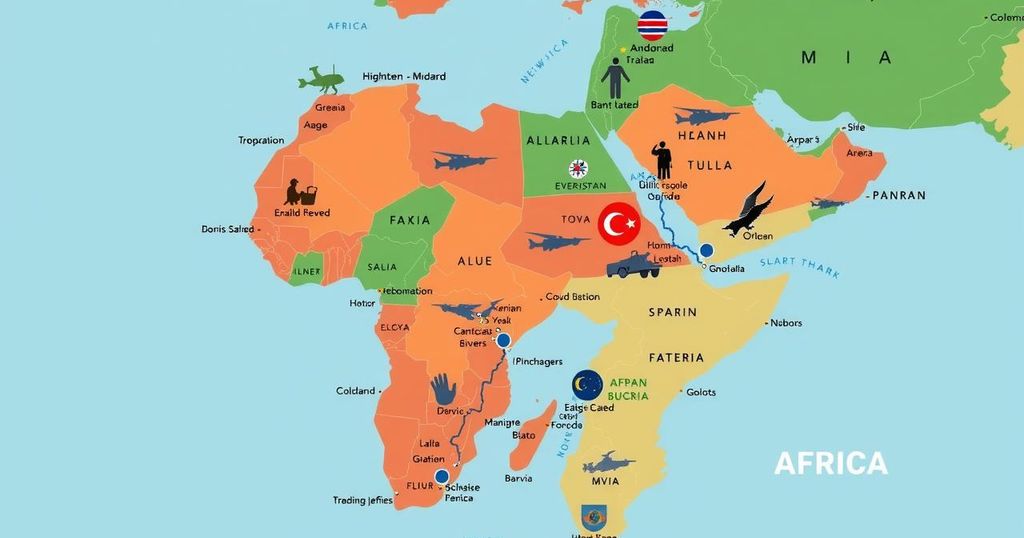Global news
ABECHE, AFRICA, ANKARA, CHAD, COTE D ’ IVOIRE, DONELLI, EL, ELEM TEPECIKOGLU, EUROPE, EUROPE/ASIA, EUROPEAN UNION, FEDERICO DONELLI, FRANCE, INTERNATIONAL RELATIONS, ISTANBUL, MOROCCO, NATO, REGIONAL COOPERATION, REGIONAL SECURITY, RFI, SA, SAHEL, SOCIAL SCIENCES UNIVERSITY, TE, TRIESTE UNIVERSITY, TURKEY, UNIVERSITY, WEST AFRICA
Jamal Walker
0 Comments
Turkey Seizes Opportunities in Africa Amid France’s Military Withdrawal
As France withdraws its military forces from the Sahel and West Africa, Turkey is seizing the opportunity to expand its influence in the region. With strategic investments and a robust defense industry, Turkey aims to fill the gap left by France, despite potential challenges posed by resource limitations and regional competition. Experts warn against overstretching as Turkey seeks to solidify its partnerships in Africa amid its economic difficulties.
Turkey is poised to capitalize on the strategic vacuum left by France’s withdrawal from its military operations in the Sahel and West Africa. Experts, as reported by RFI, indicate that while Turkey benefits from being a NATO member and a seasoned arms exporter, it must avoid excessive strain on its resources in Africa. The recent transitions, including France’s exit from Chad and the handover of its base in Côte d’Ivoire, signal a significant shift in the region’s military landscape.
International relations expert Federico Donelli highlighted that a transformational age is upon us, where traditional powers like France are reducing their footprint in Africa. This occurs not due to economic limitations, but rather at the behest of local governments who favor a diminished foreign presence. Donelli emphasizes that this scenario presents opportunities for emerging actors, such as Turkey.
Turkish President Recep Tayyip Erdogan has notably expanded Turkey’s diplomatic presence in Africa, increasing the number of embassies fourfold within two decades. He strategically leverages Turkey’s Muslim identity, contrasting it with France’s colonial past, making his nation’s endeavors more appealing to African audiences.
However, Ankara’s ambitions are tempered by the challenges presented by regional insurgent threats. Elem Tepecikoglu of Ankara’s Social Sciences University pointed out that perceptions of France have deteriorated due to its perceived inadequacies in combating terrorism in the Sahel, thus creating a favorable environment for Turkey. He notes significant anti-French sentiment enhances the opportunities for countries like Turkey to strengthen their military ties and establish cooperation agreements.
An Istanbul meeting highlighted a growing partnership between Senegal and Turkey, coinciding with Senegal’s call for the withdrawal of French military forces. Turkey’s defense industry has gained traction in Africa, offering cost-effective military solutions that appeal to various nations within the Sahel, with countries such as Nigeria and Mali procuring Turkish drones and military equipment.
Despite these advancements, Turkey remains relatively small compared to established powers like Russia, China, and the United States. Yet, Donelli argues that the current geopolitical competition may favor Turkey, as African nations might perceive ties with Turkey as a less controversial alternative to partnerships with nations like Russia.
Nonetheless, the rapid expansion of Turkey’s influence across Africa is associated with significant costs. Huseyin Bagci, an expert from Ankara’s Middle East Technical University, cautioned against diplomatic overstretch, citing limitations in Turkey’s military and economic resources. He argues that as Turkey increases its influence, the strain on these resources could challenge sustainability, particularly as its economy struggles and relations with Europe evolve towards collaboration rather than conflict in the African context.
In conclusion, Turkey’s efforts to enhance its influence in Africa are notably facilitated by France’s military withdrawal, which has created opportunities for new partnerships. Erdogan’s strategic investments and Africa-focused policies position Turkey as a significant player against traditional powers. Nonetheless, careful management of resources and diplomatic efforts will be essential to ensure that Turkey’s ambitions do not lead to overstretching its capabilities in the continent’s complex geopolitical landscape.
Original Source: www.rfi.fr




Post Comment